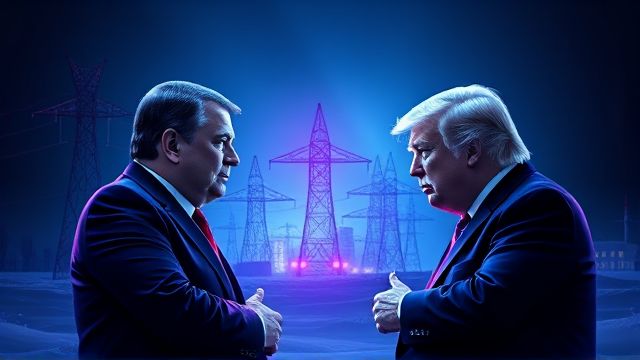Zelenskyy and Trump Discuss Ukraine Defense Amid Russian Strikes.
The second consecutive day of direct communication between Ukrainian President Volodymyr Zelenskyy and former U. S.President Donald Trump represents a critical inflection point in the geopolitical risk landscape, a strategic maneuver that must be analyzed not merely as a diplomatic exchange but as a calculated response to a rapidly escalating multi-front crisis. This dialogue, focused intently on Ukraine's defense capabilities and its critically vulnerable energy sector, unfolds against a backdrop of Russia's systematic and intensifying campaign to dismantle Ukrainian critical infrastructure, a tactical playbook straight from the Kremlin's doctrine of winter warfare designed to break civilian morale and cripple the state's operational capacity.The timing is profoundly significant; with the harsh winter looming, Russia's targeted strikes on power grids and heating facilities are not random acts of aggression but a deliberate strategy to weaponize the climate, creating a humanitarian catastrophe that could trigger massive internal displacement and strain European support networks to their breaking point. We must consider the scenario planning here: a sustained energy blackout in Ukraine does not only mean freezing civilians; it means the degradation of command-and-control systems, the disruption of military logistics, and a potential collapse in industrial output, effectively hollowing out the nation's ability to sustain a prolonged conflict.The involvement of Donald Trump, the presumptive Republican nominee, adds a layer of profound political risk and strategic uncertainty. This conversation is a direct channel that bypasses the current Biden administration, signaling to allies and adversaries alike that Kyiv is actively hedging its bets, preparing for a plausible future where U.S. security assistance—the very lifeline that has allowed Ukraine to withstand the Russian onslaught—could be fundamentally renegotiated or even severed come January 2025.From a risk analyst's perspective, this is a classic case of a state actor navigating a high-stakes transition in a patron state's leadership, a scenario with historical precedents that often end in realignment or capitulation. The content of their discussion, while private, almost certainly revolved around contingency plans for a potential funding gap, the viability of European nations to fill a multi-billion dollar void, and the grim calculus of territorial concessions versus existential survival.Expert commentary from institutions like the RAND Corporation and the Center for Strategic and International Studies consistently points to the winter of 2024-2025 as a decisive period, where military outcomes on the ground will be inextricably linked to energy resilience and the political fortitude of the Western coalition. The possible consequences are starkly bifurcated: one path leads to a fortified Ukraine, having survived another winter of terror through diversified aid and robust air defenses, emerging with greater leverage for any future negotiations.The other, more perilous path, sees a fractured Western alliance, a Ukraine forced into a defensive crouch with dwindling ammunition, and a resurgent Russia emboldened to press its advantages not only in Ukraine but in testing NATO's resolve in the Baltics or the Balkans. The broader context cannot be ignored—this is also a signal to European capitals in Berlin, Paris, and London that the era of unambiguous American leadership may be concluding, forcing them to accelerate their own defense industrialization and strategic autonomy plans, a tectonic shift in the transatlantic security architecture that has held since 1949. In essence, this phone call is a single data point in a vast and complex risk matrix, but it illuminates the central fault line of the conflict: the battle is no longer just in the trenches of Donbas but in the winterized power plants of Kharkiv, the political salons of Washington, and the fragile consensus of a continent staring down its most severe security challenge since the Cold War.
Latest News
In a move that will undoubtedly be dissected by historians and political strategists for years to come, President Trump has formally signed a Gaza peace plan,
56 minutes ago0 comments
In a move that will be scrutinized by historians for its geopolitical weight, the initial phase of a Gaza ceasefire deal was formally signed in Sharm
1 hour ago0 comments
The political foundations of Madagascar trembled this week as President Andry Rajoelina announced from an undisclosed safe house that he had survived a direct
1 hour ago1 comments
The scene was one of profound disarray, a stark contrast to the solemn dignity one expects when crossing the final threshold into American life.
1 hour ago1 comments
In a development that geopolitical risk analysts have been modeling for months, a significant hostage and prisoner exchange between Israel and Palestinian
2 hours ago1 comments
The political stability of Madagascar, an island nation perpetually teetering on the edge of crisis, has been violently upended.
2 hours ago0 comments
In a move that will be scrutinized by historians for its parallels to the grand diplomatic gambits of the twentieth century, President Donald Trump has
2 hours ago1 comments
In a high-stakes geopolitical maneuver that analysts are already comparing to a tense hostage exchange from a Cold War thriller, Israeli and Palestinian
2 hours ago0 comments
It’s quiet here...Start the conversation by leaving the first comment.
